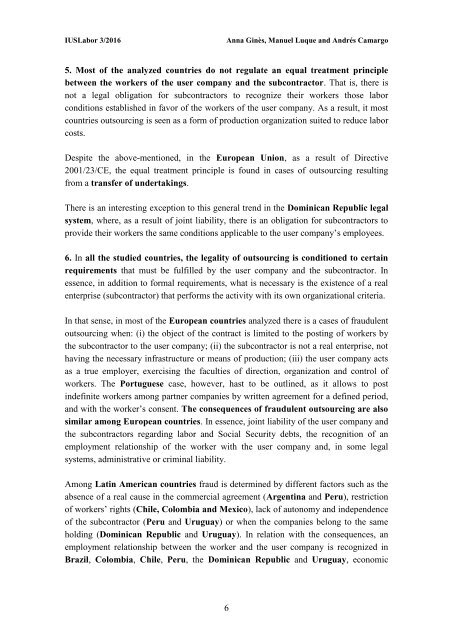wd9Hrt
wd9Hrt
wd9Hrt
You also want an ePaper? Increase the reach of your titles
YUMPU automatically turns print PDFs into web optimized ePapers that Google loves.
IUSLabor 3/2016<br />
Anna Ginès, Manuel Luque and Andrés Camargo<br />
5. Most of the analyzed countries do not regulate an equal treatment principle<br />
between the workers of the user company and the subcontractor. That is, there is<br />
not a legal obligation for subcontractors to recognize their workers those labor<br />
conditions established in favor of the workers of the user company. As a result, it most<br />
countries outsourcing is seen as a form of production organization suited to reduce labor<br />
costs.<br />
Despite the above-mentioned, in the European Union, as a result of Directive<br />
2001/23/CE, the equal treatment principle is found in cases of outsourcing resulting<br />
from a transfer of undertakings.<br />
There is an interesting exception to this general trend in the Dominican Republic legal<br />
system, where, as a result of joint liability, there is an obligation for subcontractors to<br />
provide their workers the same conditions applicable to the user company’s employees.<br />
6. In all the studied countries, the legality of outsourcing is conditioned to certain<br />
requirements that must be fulfilled by the user company and the subcontractor. In<br />
essence, in addition to formal requirements, what is necessary is the existence of a real<br />
enterprise (subcontractor) that performs the activity with its own organizational criteria.<br />
In that sense, in most of the European countries analyzed there is a cases of fraudulent<br />
outsourcing when: (i) the object of the contract is limited to the posting of workers by<br />
the subcontractor to the user company; (ii) the subcontractor is not a real enterprise, not<br />
having the necessary infrastructure or means of production; (iii) the user company acts<br />
as a true employer, exercising the faculties of direction, organization and control of<br />
workers. The Portuguese case, however, hast to be outlined, as it allows to post<br />
indefinite workers among partner companies by written agreement for a defined period,<br />
and with the worker’s consent. The consequences of fraudulent outsourcing are also<br />
similar among European countries. In essence, joint liability of the user company and<br />
the subcontractors regarding labor and Social Security debts, the recognition of an<br />
employment relationship of the worker with the user company and, in some legal<br />
systems, administrative or criminal liability.<br />
Among Latin American countries fraud is determined by different factors such as the<br />
absence of a real cause in the commercial agreement (Argentina and Peru), restriction<br />
of workers’ rights (Chile, Colombia and Mexico), lack of autonomy and independence<br />
of the subcontractor (Peru and Uruguay) or when the companies belong to the same<br />
holding (Dominican Republic and Uruguay). In relation with the consequences, an<br />
employment relationship between the worker and the user company is recognized in<br />
Brazil, Colombia, Chile, Peru, the Dominican Republic and Uruguay, economic<br />
6


